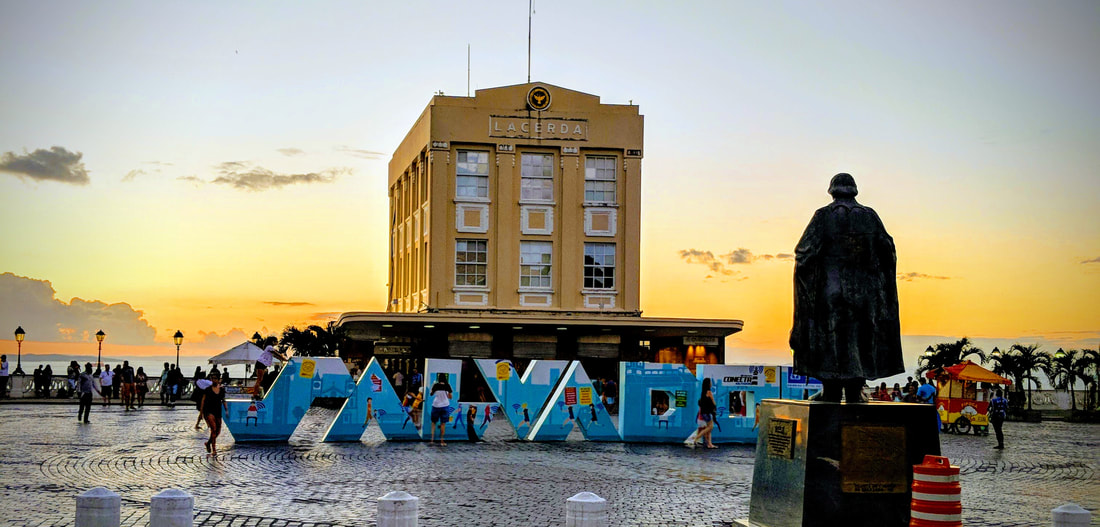|
By Eliana Schmaltz After a quick three weeks filled to the brim with travel, tummy warming food, and good company, I finally had some time to slow down and reflect on what I have all experienced, observed, and learned. I was surrounded by people that I have known for such a short amount of time but still felt so comfortable and at home. As I sat watching the kids play at the party, my mom would circle around every so often to send more food in my direction, a lot of which she made herself for days in advance. My sister, Ana, covers for me and tells mom I ate my hot dog when I didn’t. I think the only word to describe how I was feeling was content. I realized there were only moms and their kids at the birthday party. I asked Ana about this, and she said the dads typically see events like this as a waste of time. This stood out to me because Ana had emphasized how these big birthday celebrations were culturally very popular. Reflecting on my three weeks here, I realized how heavily my experience was influenced by women. I lived with my mom, Ana, and Clair. Multiple times a day our neighbor Louanna would come over as well as Mom’s daughter Amanda, Amanda’s girlfriend, and another lady that lives downstairs. While I couldn't always understand the language, I immediately could tell they were all strong, confident women. My subtopic for the course was violence against minorities. In Brazil it is estimated that one woman was affected by violence every four minutes in 2017 and an average of 13 women were murdered each day (Araujo 2021, 123). While I originally learned that this spring, the statistic became even more painful after being in Brazil. In another study, it was found that positions such as head of the family, family provider, and exacerbated sexuality are social attributes of masculinity that incite gender-based violence (Silva 2020). The literature surrounding violence against women, points to gender norms and toxic masculinity as being the driving factors of this generational and cultural violence. Looking within my household, my Mom strongly followed gender norms. On her “get to know me” form, she listed housework as her hobbies. Within our apartment complex, the residents typically were middle aged and white. This didn’t surprise me seeing as we lived in a nice building and racial inequity is a major issue in Brazil. In 2006, Brazil moved slightly down in the ranking of the world's most unequal countries when it was moved from eighth to tenth (Pacheco 2008, 714). There was consistently construction going on throughout our route to ICR. Every person we saw performing manual labor throughout our three weeks was Black. Little instances like this were observable almost every day. For a country with such blatant racial inequities, it is shocking to see these issues overlooked. While homicide occurs globally, we can statistically see that it happens at higher rates in Brazil than in most countries. This is especially true when we look specifically at the LGBT community. According to the World Health Statistics 2019, there were an estimated 477,000 deaths globally due to homicides in 2016. Brazil accounted for around 12.8% of this total, representing the seventh largest homicide rate in the Americas (WHO 2018). My mom's biological children and our host sister Ana are all part of the LGBT community. They do not hide it in public, which I only thought of because of the high rate of violence. The overwhelming amount of violence against minorities that I read about in the U.S. was heartbreaking to read. However, now that I have met people that fall into these vulnerable groups, I am even more disturbed by the danger. If my siblings are anxious about being a part of the statistic, they do not show it at all. If anything, their confidence within themselves seems to reflect their confidence that this violence can change too. Araujo, Victor, and Malu A. C. Gatto. 2022. “Can Conservatism Make Women More Vulnerable to Violence?” Comparative Political Studies 55, no. 1: 122-153. Pacheco, Tania. 2008. “Inequality, Environmental Injustice, and Racism in Brazil: Beyond the Question of Colour.” Development in Practice 18, no. 6: 713–725. Silva, Andrey Ferreira da, Nadirline Pereira Gomes, Júlia Renata Fernandes de Magalhães, Fernanda Matheus Estrela, Anderson Reis de Sousa, Jordana Brock Carneiro. 2020. “Social Attributes of the Male That Suscept the Violence by Intimate Partner.” Rev Bras Enferm 73, no. 6 (June): 1-7. World Health Organization (WHO). 2018. “World Health Statistics 2018: Monitoring Health for the SDGs.” WHO. https://www.who.int/gho/publications/world_health_statistics/2018/en/.  Eliana (Ellie) Schmaltz is a rising junior at the College of Saint Benedict. She is pursuing a degree in political science and sociology in the hopes to attend law school after graduation. After law school, she would like to be a family lawyer and give back to the community that raised her. Ellie is originally from a small town called Eden Valley located in Central Minnesota. She looks forward to learning more about Brazilian culture and experiencing everything the scenic country has to offer while studying abroad in Salvador.
0 Comments
Leave a Reply. |
Archives
June 2024
Categories
All
|

 RSS Feed
RSS Feed
